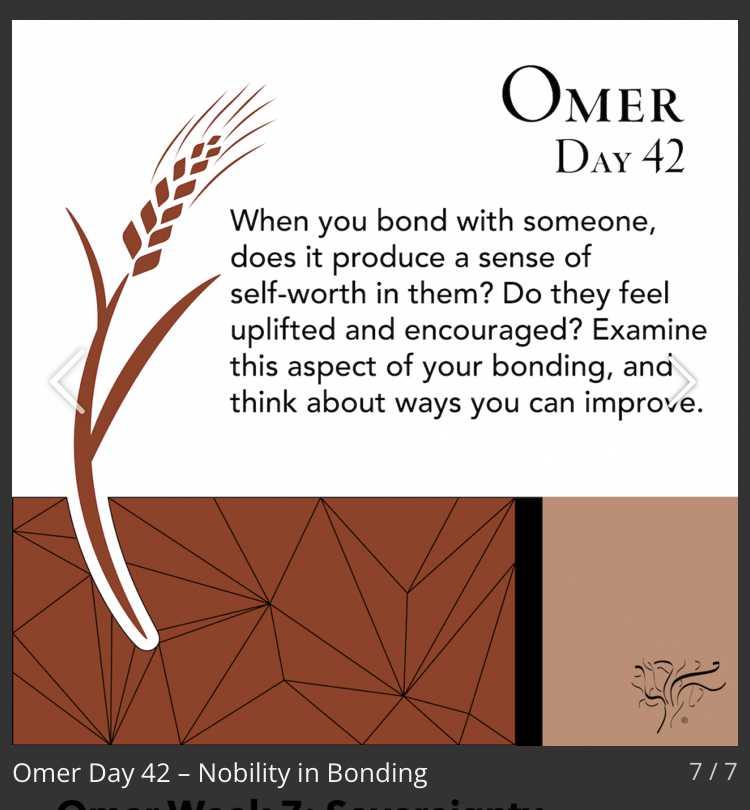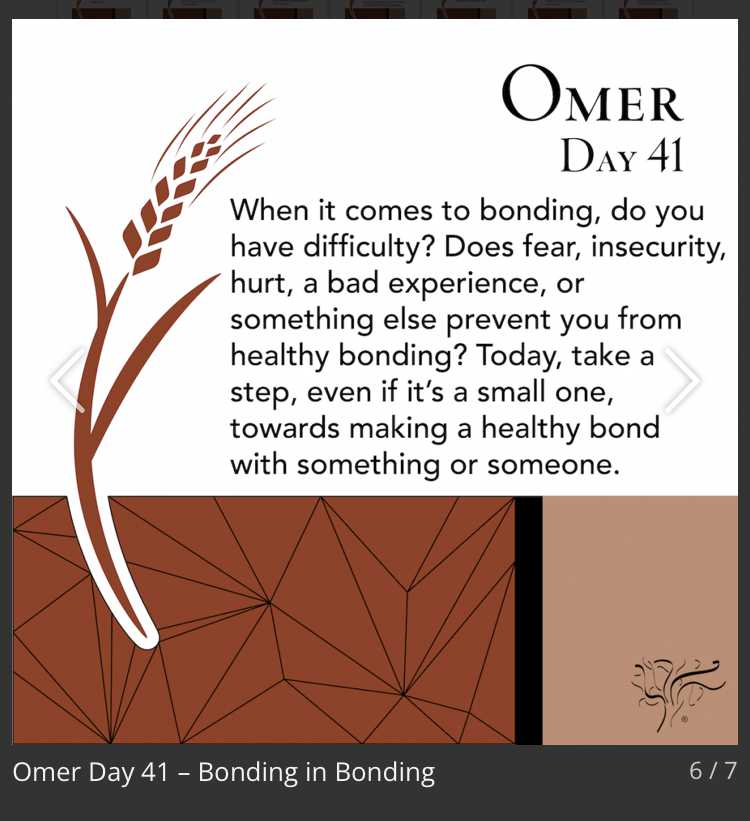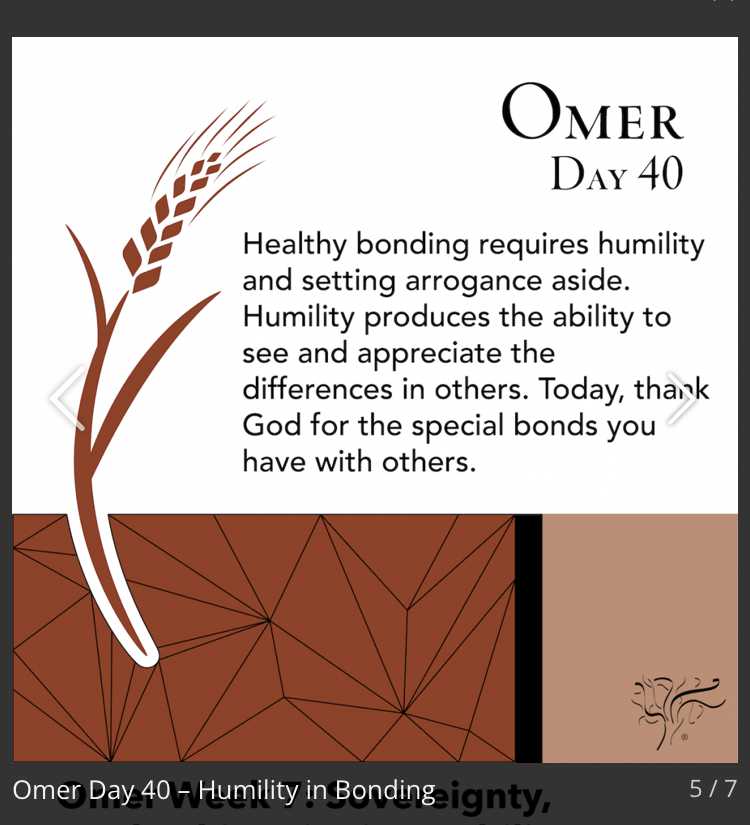Watch
Events
Articles
Market
More
Netzach of Yesod
An essential component of bonding is its endurance. Its ability to withstand challenges and setbacks. Without endurance there is no chance to develop true bonding.
Am I totally committed to the one I bond with? How much will I endure and how ready am I to fight to maintain this bond? Is the person I bond with aware of my devotion?
Exercise for the day: Demonstrate the endurance level of your bonding by confronting a challenge that obstructs the bond.




Malchut of Yesod
Bonding must enhance a person's sovereignty. It should nurture and strengthen your own dignity and the dignity of the one you bond with. Does my bonding inhibit the expression of my personality and qualities? Does it overwhelm the one I bond with?
Exercise for the day: Emphasize and highlight the strengths of the one you bond with.




Yesod of Yesod
Examine the bonding aspect of bonding. The forms it takes and its level of expression. Every person needs and has the capacity to bond with other people, with significant undertakings and with meaningful experiences.
Do I have difficulty bonding? Is the difficulty in all areas or only in certain ones? Do I bond easily with my job, but have trouble bonding with people? Or vice versa? Do I have problems bonding with special events in my life? Examine the reasons for not bonding. Is it because I am too critical and find fault in everything as an excuse for not bonding? Am I too locked in my own ways? Is my not bonding a result of discomfort with vulnerability? Have I been hurt in my past bonding experiences? Has my trust been abused? Is my fear of bonding a result of the deficient bonding I experienced as a child? To cultivate your capacity to bond, even if you have valid reasons to distrust, you must remember that G‑d gave you a Divine soul that is nurturing and loving and you must learn to recognize the voice within, which will allow you to experience other people's souls and hearts. Then you can slowly drop your defenses when you recognize someone or something you can truly trust.
For bonding to be possible it must embody the other six aspects of bonding. Successful bonding must also include actualizing the bond in constructive deeds.
One additional point: Bonding breeds bonding. When you bond in one area of your life, it helps you bond in other areas.
Exercise for the day: Begin bonding with a new person or experience you love by committing designated time each day or week to spend together constructively.




Day Five of Week 6: Hod of Yesod
40th Day of the Omer
Humility is crucial in healthy bonding. Arrogance divides people. Preoccupation with your own desires and needs separates you from others. Humility allows you to appreciate another person and bond with him. Bonding that is just an extension of your own needs is only bonding tighter with yourself. Healthy bonding is the union of two distinct people, with independent personalities, who join for a higher purpose than satisfying their own needs.
True humility comes from recognizing and acknowledging G‑d in your life. Am I aware of the third partner - G‑d - in bonding? And that this partner gives me the capacity to unite with another, despite our distinctions.
Exercise for the day: When praying acknowledge G‑d specifically for helping you bond with others.




Netzach of Yesod
An essential component of bonding is its endurance. Its ability to withstand challenges and setbacks. Without endurance there is no chance to develop true bonding.
Am I totally committed to the one I bond with? How much will I endure and how ready am I to fight to maintain this bond? Is the person I bond with aware of my devotion?
Exercise for the day: Demonstrate the endurance level of your bonding by confronting a challenge that obstructs the bond.




Thought for Today: Shabbat May 20:
Grow strong in your weakness. Some of YHVH’s children He gifted with abundant strength and stamina. Others like many of us, have received the humble gift of frailty. Our fragility is not a punishment, nor does it indicate lack of faith. On the contrary, weak ones like the many of us, must live by faith, depending on Adonai Elohiym to get us through the day. YHVH is developing our ability to trust Him, to lean on Him, rather than our own understanding. Many of us’ natural preference is to plan out our day, knowing what will happen when. YHVH’s preference for us is to depend on Him continually, trusting Him to guide us and strengthen us as needed. This is how we grow strong in our weakness.



BIBLE STUDY LESSON 11
SERIES P --- YHVH’S PROPHETS
JERUSALEM FALLS
THE FALL OF JERUSALEM
From Jeremiah 39-40
Once again King Nebuchadnezzar of Babylon came against Jerusalem and besieged it. It was in January of the ninth year of King Zedekiah’s reign when the king of Babylon brought his army and surrounded the city. For two years they besieged the city, until July of the eleventh year, when they finally broke through the wall and conquered Jerusalem. The princes of the king of Babylon entered the city in triumph and sat in the middle gate. Among the princes who came were Nergal-sharezer, Saingar-nebo, Sarsechin the Rab-saris, Nergal-sharezer the Rab-mag, as well as other princes of the king of Babylon. When King Zedekiah and his soldiers realized that the city was lost, they fled from Jerusalem by night, leaving it through the gate by the king’s garden, between the two walls. They they ran toward the Arabah. But the Chaldeans pursued Zedekiah and caught up with him in the plains of Jericho. They captured him and took him to Riblah in the land of Hamath, where King Nebuchadnezzar of Babylon waited to judge him. Nebuchadnezzar forced Zedekiah to watch his own children and the nobles of Judah murdered before his eyes. Then the king of Babylon gouged out Zedekiah’s eyes, bound him in chains, and took him away to Babylon. Back in Jerusalem, the Babylonian army burned the king’s palace and the houses of the people and broke down the walls of the city. Nebuzar-adan, the captain of the guard of the Babylonian army, took the survivors of the city, as well as the people of Judah who had deserted to him, and sent them away to Babylon. Only the very poor were left behind in the land of Judah. To these were given fields and vineyards. Nebuchadnezzar had given orders to Nebuzar-adan to find Jeremiah. [Take good care of him and do not hurt him,] the king ordered. [Give him whatever he wants.] Nebuzar-adan, captain of the king’s guard, went with Nebushasban the Rab-saris, Nergal-sharezer the Rab-mag, and the other princes of King Nebuchadnezzar to find Jeremiah. They took him from the palace prison and put him in the care of Gedaliah the son of Ahikam and grandson of Shaphan, who took him home so that he could live among his people. Before all this happened, while Jeremiah was still in the palace prison, Adonai had spoken to him concerning Ebed-melech. [Tell Ebed-melech the Ethiopian that Adonai of hosts, the YHVH of Israel has said: [‘I will do all that I have promised to do to Jerusalem and will punish it as I have said. But Ebed-melech will be spared, for Adonai will not permit him to be killed by those whom he fears, for he has put his trust in Me.’] Jeremiah was still in chains when Nebuzar-adan, captain of the guard, took him with all the other captives of Judah to Ramah, on the way to Babylon. There Nebuzar-adan released Jeremiah from his chains and set him free. [Adonai your YHVH has brought this punishment on this place as He said He would,] said Nebuzar-adan. [Your people have sinned against Adonai and refused to obey Him, so this punishment has come upon them. But today I am setting you free from your chains. If you want to come with me to Babylon, I will take care of you there. But if you think it is wrong for you to come to Babylon, then you should stay here. You may go anywhere in the land that you wish. If you want to go back to live with Gedaliah the son of Ahikam, and grandson of Shaphan, do so, for the king has appointed him governor of all the cities of Judah. You may live with him or you may go anywhere in the land you wish to live. The captain of the guard also gave food and money to Jeremiah when he released him. Then Jeremiah went to Mizpah and lived with Gedaliah, choosing to remain with his own people in his own land. Before long the leaders of the scattered forces which were still out in the countryside heard that Gedaliah had been appointed over the people who remained in the land, so they came to see him at Mizpah, where he ruled. Among those who came were Ishmael the son of Nethaniah, Johanan and Jonathan the sons of Kareah, Seraiah the son of Tanhumeth, the sons of Ephai the Netophathite, and Jezaniah the son of a Maachathite, as well as their men. [You must not be afraid to serve the Chaldeans,] Gedaliah assured them. [If you live in this land and serve the king of Babylon, all will be well with you. I will remain here at Mizpah to represent the Chaldeans to you and you to them. Now go and live in the cities you have taken over and gather the fruits which are ready for harvest.] Soon some other Jews, who had run away to Moab and Edom and to live among the Ammonites, began to return also. They had heard that the king of Babylon had left some people behind and had appointed Gedaliah governor, so they also came to talk with him at Mizpah. As they went out from there to the deserted countryside, they gathered all the wine grapes and other fruits which they could use. Not long after that, Johanan the son of Kareah and some other captains of the troops that had been in the countryside came to see Gedaliah. [Are you aware that Baalis the king of the Ammonites has sent Ishmael the son of Nethaniah to kill you?] they said. But Gedaliah would not believe that their report was true. Gedaliah and Johanan then had a secret meeting and Johanan begged Gedaliah to listen. [Let me kill Ishmael secretly so that he will not harm you,] said Johanan. [If he should kill you, what would all of the Jews who have returned here do? Why should these few remaining people of Judah also perish?] But Gedaliah would not let Johanan do this. [You are falsely accusing Ishmael,] he said.
COMMENTARY
KING NEBUCHADNEZZAR
In 587 B.C. Nebuchadnezzar of Babylon again attacked the city of Jerusalem. Earlier the Babylonians had taken captives. This time the king of Judah fled, but was captured and blinded by the Babylonians. Just as Jeremiah had warned, the holy city was burned and its walls torn down. Jerusalem joined a long line of magnificent cities that were reduced to ruins. Today the name Nebuchadnezzar conjures up the glory of an ancient empire. But twenty-five hundred years ago, the name struck fear in the hearts of enemies and pride in the hearts of Babylonians. By the time the great king died, the fame of his name and his capital, Babylon, had spread across the ancient world. That was exactly what Nebuchadnezzar had desired from the start. As crown prince, Nebuchadnezzar led campaigns of war in the place of his aging father. Years before, his father had conquered the Assyrians by joining with the mountain people, the Medes. The alliance gave Babylon the right to invade lands to the west, and Media the right to the east. While countering Egyptian advances into Syria and Palestine, young Nebuchadnezzar heard the news of his father’s death. Distrusting his younger brother’s ambitions, he rushed home to be crowned king. The twenty-four-year-old king inherited advantages that helped him achieve his dream of ruling the world. Because of his father’s alliance with the Medes, the northern frontiers of his empire were secure. He could turn his attention elsewhere, unlike the Assyrians who fought constantly to keep power at their borders. Nebuchadnezzar adopted some of the strategies that had worked well for Assyrians. He patterned his empire after Assyrian methods of organization, and copied their cruel practice of torturing and killing defeated enemies. In Assyrian style, he conducted yearly campaigns to collect tribute and crush rebellions in Syria, Palestine and Egypt. His last campaign against Judah brought destruction to Jerusalem, then ruled by Zedekiah. His army looted the city, burned Solomon’s temple and deported all but the poor. The tribute collected on these campaigns went toward Nebuchadnezzar’s building projects. With prisoners of war toiling as builders, the great king constructed a new palace adorned with cedar and gold, He restored the sacred Processional Way, flanked by over one hundred sculptured lions. He ensured the capital’s protection with seventeen miles of new double-defence walls, dams and moats to the north and south, and an artificial lake. He brought water into Babylon from the Tigris River through canals. Legend even credits Nebuchadnezzar as architect of the Hanging Gardens, one of the seven wonders of the ancient world. According to tradition, the king built the gardens to comfort his homesick Median wife. The great king also expended his energy in erecting fifty-four temples in Babylon and other cities. He worshiped all the Babylonian gods, but paid special attention to Bel and Marduk, protectors of his kingship. The temples’ gold, silver and copper domes gleamed in the Babylonian sun, proclaiming the religious fervour of their builder. Nebuchadnezzar frequently offered food, wine and precious metals to his gods, and attended religious ceremonies along with his people. The inscriptions on his buildings usually include two hymns and close with a pagan prayer. Nebuchadnezzar’s pride grew with his power. By age sixty, the king had become the most powerful man in the world and his capital the richest city in the world. He decided to be worshiped alongside his gods, and ordered his craftsmen to make a huge gold statue of himself. Nebuchadnezzar’s ruthless energy had run out of goals when, according to the Bible, the king went insane and thought he was an ox. The lack of inscriptions from the latter years of his reign indicate that he may have been absent from government for a time. When he regained health, the Empire was shaken with disorder. At the age of sixty-eight, after forty-three years on the throne, Nebuchadnezzar died. The ungifted kings that succeeded him ruled under the shadow of a rising new power, Persia.


